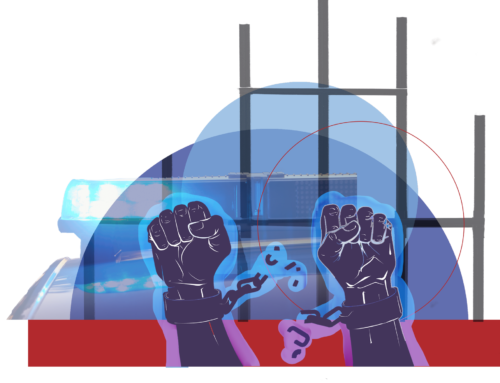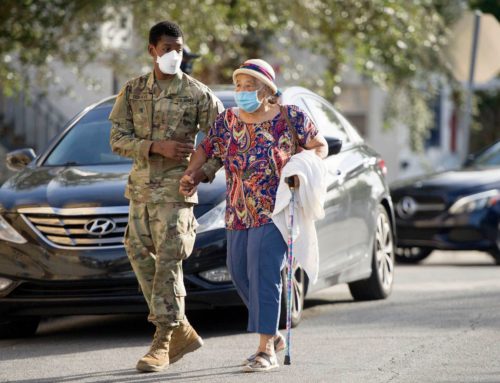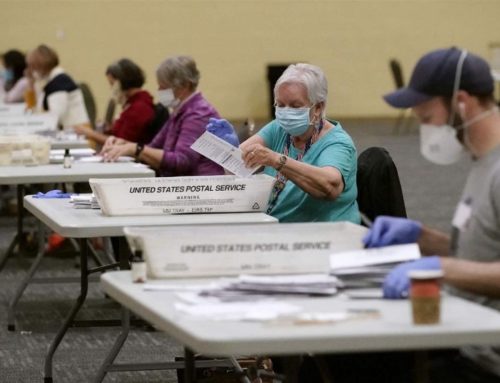Mail voting is the best method to comply with social distancing protocols, increase voter turnout, and is a system less susceptible to foreign interference. But as a number of states remain unprepared to handle the influx of mailed-in ballots, a robust campaign of misinformation is challenging effective state mitigation measures and threatening millions of voters’ ability to cast a ballot.
As the U.S. approaches its peak in infections and Covid-19-related deaths, health experts continue to press that more serious social distancing measures must take effect and election professionals have explained that mail-in systems may be the most effective, if not only effective, way to salvage the integrity of our electoral system. The Centers for Disease Control and Prevention lists postal balloting as its number one recommendation in order to reduce anticipated crowd sizes at polling locations, and in response many states have considered a number of temporary reforms that include expanding availability of absentee ballots for their residents, extending-early voting periods, and transferring polling location away from vulnerable populations.
The benefits of mail voting are substantial. The state of Washington’s current vote-by-mail system saved the state from having to delay its scheduled primary and eased the state’s implementation of a number of COVID-19 specific measures like requiring officials to wear and change gloves frequently and wash their hands while handling ballots, advising voters to use water instead of their own saliva to seal their envelopes, and to place their ballots in an official drop box. The Florida Democratic Party’s effort to institute mail voting before 2018 to boost turnout was a successful $1 million initiative that resulted in nearly 2.6 million people voting by mail – a double-digit marginal increase from 2014 to 2018.
Alabama, Georgia, Kentucky, Louisiana, Mississippi, North Carolina, Texas and a number of other states have postponed their statewide primaries, and some states like Alabama and West Virginia have started to implement mail-in voting and waive procedural restrictions. Such changes do, however, come with difficulties. For all but five states that have fully implemented mail voting, the shift is expected to top a totaled $2 billion. Particularly vulnerable southern states have already experienced difficulty navigating the shift to expand their own systems. And despite the bipartisan $2 trillion third federal relief package that recently allocated $400 million in grants for increased state election security measures, a reignited campaign of misinformation grounded in traditionally unsupported allegations of “voter fraud” is back. This past Monday, President Trump explained, “you’d never have a Republican elected in this country again” if vote-by-mail procedures were expanded in the states. “Mail ballots are very dangerous for this country because of cheaters. They go collect them. They are fraudulent in many cases. They have to vote. They should have voter ID, by the way.”
Such allegations are unfounded and remain empirically unsupported. States should not be dissuaded from implementing expanded protections for their electorates. Southern state leaders should avoid ideological conflicts and recognize the numerous vulnerabilities faced by their own residents. Recent southern state responses can serve as models to other states that have yet to fully address Covid-19-related threats to voting, like:
-
·The Georgia secretary of state’s announcement that his office would mail absentee ballot request forms to all 6.9 million active voters in the state – a measure estimated to cost approximately $13 million which the state plans to absorb using existing federal grant money.
-
West Virginia’s and Alabama’s temporarily change permitting everyone to vote by absentee ballot in their spring and summer election. The guidance has not been extended to elections in November; and
-
Virginia’s recently passed HB 1 “permit[ting] any registered voter to vote by absentee ballot in any election in which he is qualified to vote.” This will extend to elections in both May and November.
Voters should not have to choose between protecting their health and exercising their right to vote. Florida, Arkansas, Tennessee, Louisiana, and others must follow the lead of their southern neighbors to protect the health and the rights of their citizens to freely and fairly vote by properly expanding their mail-in voting systems.




